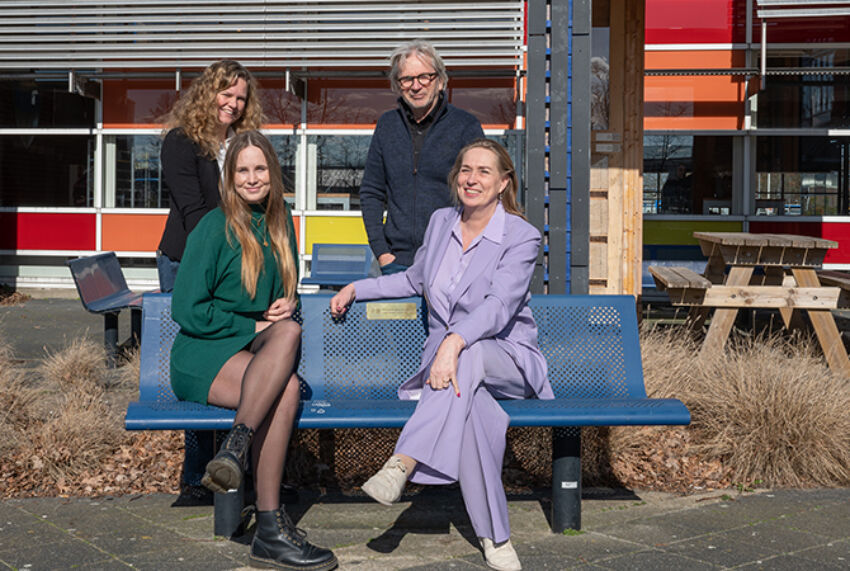How are you feeling? It sounds like a simple question, yet we don't ask it enough to each other. Especially for people struggling with sadness, depression or thoughts of suicide, the question can mean a world of difference. To draw attention to this, a golden sign has been placed on two HZ benches. We talked about it with nursing lecturer Sonja de Graaff, HZ student Lise (who did an internship in the GGZ), student psychologist of HZ Hans Reijnierse and president of the Board of Directors Barbara Oomen.
The signs are part of 113 Suicide Prevention's campaign. Nursing teacher Sonja de Graaff took the initiative. "Making mental health open to talk is much needed among young and old. That really doesn't have to be about suicide right away. It is important that we dare to be open about our doubts, gloom or fears within and outside HZ. Students and staff who struggle with this will often not shout it from the rooftops. That is why it is so important that we dare to ask and to listen. The bench is a symbol. It invites you to have a good conversation, but the place where you do it doesn't matter."
Depression is not a sign of weakness
Many people find talking about mental problems difficult or uncomfortable. Sonja also notices this within her nursing programme. "Our education is all about caring and helping others. The strange thing is that when it comes to the topic of suicide, a kind of threshold arises to talk about it with each other. Of course, this is not limited to this programme and not only to the HZ. It is a social taboo. That's problematic, because a conversation can mean the difference between someone going for help, or someone stepping out of life."
Third-year nursing student Lise did a six-month internship in Emergis' Medium Care department. In there, she was exposed to the topic of suicide and also learned for herself how important expressing your feelings is. "It was a wonderful internship, but also intense. I am a fairly down-to-earth person, but I benefited a lot from the openness that prevailed on the department. Healthcare professionals can feel extremely responsible for caring for others, but can sometimes completely ignore their own mental health." Sonja: "I do recognize that. Maybe it also stems from the image that, as a care worker, you have to stand firm in your shoes. But we are all human beings. Hiding your feelings away is really not needed."
The text continues below the image

(On the bench: nursing student Lise and chairperson Barbara Oomen. Behind the bench: nursing lecturer Sonja de Graaff and HZ student psychologist Hans Reijnierse)
Why we find talking so difficult
Especially when we suspect sadness or depression, we find it hard to start the conversation. According to HZ student psychologist Hans Reijnierse, this has several reasons. "Sometimes there is the fear of giving the other person ideas. But it really doesn't work that way. If someone is not carrying suicidal thoughts, you won't awaken them by talking about it either. And if the ideas are already there, they are already there. Sometimes the fear of the answer also plays a role. Suppose the other person says they are not doing well at all mentally, what do you do then? There is also the reluctance: is it okay to ask someone this? Isn't it too private?"
As far as Hans is concerned, all these blockages can be swept off the table. "Your conversation can only do good. When you sincerely ask how someone is doing, the other person feels seen and appreciated. People struggling with depression often feel they are not worth the other person's attention. By asking that one simple question, you are actually saying: I have seen you and I think you are worth it. Furthermore, don't make the conversation too heavy. You don't have to solve the problem. Listen, give air, show that it is okay."
Barbara Oomen: it starts with looking out for each other
President of the Board of Directors Barbara Oomen also embraces the call to really start seeing each other and dare to have the conversation about mental problems. "The reports on depression among young people are crystal clear. This is a generation that has had a lot to deal with in recent years, beyond the ups-and-downs of growing up. HZ students are no exception. We must do everything in our power to be there for students and staff in case of mental problems. It all starts with looking out for each other. Taking the time for a conversation. And pointing out to each other the places where you can get help. Inside and outside HZ."
Guest lectures
Sonja is also working with her colleagues from the Nursing course to offer lessons to remove the taboo among students. "We are now organizing guest lectures by young people from the Youth Council, who are or have been struggling with mental problems themselves. We hope to better reach our students with a generational peer, who speaks the same language. Someone who also just likes parties and knows the student's world. By doing so, we hope to create the awareness that this person could have been someone from our own group. And you can talk to him or her about it just fine."
Do you feel the need to talk about suicide?
You can always turn to 113 Suicide Prevention. You can call or chat completely anonymously.
Would you like to talk to someone within the HZ about your problem?
Within the HZ, students can talk to deans, study career coaches, confidential counsellors, the student psychologist or the Student Success Centre.
